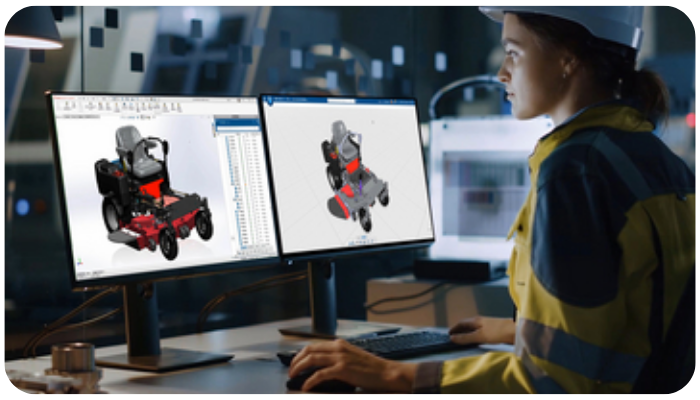Simulations
What is Simulation?
Simulation is being able to create or construct a model of an existing or proposed system (e.g., a structure, an element, a project, your body’s organs) in order to identify and understand the factors which control the system in order to protect its behavior in the future.
A simulation can be performed on almost any system which can be quantitatively described using equations and/or rules.
Why is simulation software used?
Using simulations is an important and powerful tool because it facilitates the evaluation of alternative designs, plans, and/or projects without the need to experiment on a real system, which may be prohibitively expensive, time-consuming, or merely impractical.
The purpose of this is to engage in active speculation on the efficacy of a system without having to directly experiment with it (and incur the costs incurred by field tests, prototypes, etc..)
Industry Challenges
Companies are facing many challenges, including globalization, cost reductions, and shorter development cycles, as they strive to deliver new and innovative products to market faster.
During the design phase of a product, manufacturers are using realistic simulations to reduce the reliance on physical testing, reduce part weight, and evaluate alternative materials for optimum performance in order to gain a competitive advantage in the marketplace.
Importance of Simulia Software in the industry
Companies are taking advantage to consolidate their processes & tools, reduce costs & inefficiencies and gain competitive strength. It is very good for modeling material and structural problems. There are many constitutive models to analyze the nonlinear behavior of steel, concrete, soil, etc.
Perfect simulia software – Abaqus software
Originally released in 1978 by Dassault Systemes, Abaqus is a software package for finite element analysis and computer-aided engineering. There are five core products in the Abaqus product suite:
The software application ABAQUS is used to model and analyze mechanical components (pre-processing) and visualize the results of finite element analysis (FEA). ABAQUS simulation software offers complete and powerful solutions for routine and sophisticated engineering problems
By using Abaqus Unified FEA, leading companies to streamline processes, reduce costs, and gain a competitive edge.
It is allowing companies to consolidate their processes & tools, reduce costs & inefficiencies, and gain a competitive advantage. Especially useful for modeling material and structural problems. Steel, concrete, soil, concrete, etc., can all be modeled constitutively.
The unified Finite Element Analysis solution by Abaqus software
A finite element analysis indicates whether a product will break, wear out, or work as intended. FEA works by breaking an object into large numbers of finite elements. The behavior of each element can be predicted using mathematical equations.
Abaqus software offers below the solutions for finite element analysis.
MODELING
When working with the Abaqus hybrid modeling tool, users are able to work with geometry-based data and meshes without associated geometry.
It also offers a powerful modeling and visualization environment that supports Abaqus solver technology, customization capabilities, reusable analysis workflows, and the option to implement user-defined subroutines.
Geometry
The constraint-driven sketcher can import parts and assemblies from CAD systems, as well as create parts and assemblies.
Meshing
Abaqus/CAE features a comprehensive meshing environment as well as sophisticated mesh creation approaches that simplify and speed up mesh creation.
Contact
In addition to being able to model interactions between deformable bodies and rigid bodies, Abaqus also has a robust capability for modeling self-contact.
Automated contact detection in Abaqus reduces the amount of missed contact definitions and the amount of time it takes to define contacts in complex assemblies
Specialized Techniques
In applications where thermal fatigue is of concern, such as electronics or powertrains, the direct cyclic procedure provides a computationally efficient way to examine the steady-state response to cyclic loading
Advanced Materials
Environmental concerns, increasing regulations, and the desire for lighter and more efficient products have forced designers to seek out new materials, such as lead-free solder, composites, and polymers.
ADVANCED ANALYSIS
Linear & Nonlinear
In Abaqus, implicit solution technology is ideal for solving static and low-speed dynamic events such as sealing pressure in a gasket joint or crack propagation in a composite airplane fuselage.
In addition to consumer electronics drop testing, automotive crashworthiness, and ballistic impact testing, Abaqus’ explicit solution technology is well suited to high-speed dynamic events.
Multiphysics
Currently, many industrial applications involve multiple physical phenomena that interact with each other. Engineers must account for the interaction between blood flow and stent deformation in order to design safe and effective drug-eluting stents, for example.
Working in every industry almost,
- Abaqus for Civil engineering
- Abaqus for Structural Engineering
- Mechanical engineering
- Transportation and mobility
- Aerospace and defense
- Marine and Offshore
- Industrial equipment
- Hi-tech
- Home and Lifestyle
- Consumer packaged goods and retail
- Life science and retail
- Energy and material
SIMULIA Abaqus Online training
Train yourself for the Abaqus software with PIGSO Online Abaqus Courses and Training Program.
Conclusion:
Abaqus is a software suite for finite element analysis and computer-aided engineering. Using SIMULIA Technology in Engineering Applications, simulate accurate environments to validate their accuracy. It’s the best simulation software as compared to its competitors and perfectly fit for the many top engineering fields like Mechanical, Civil engineering, Aerospace, Automobile, etc.

Mayank Panchal is the founder of PIGSO Learning. He has many years of experience in teaching, curriculum development, and instructional designer in civil engineering, Mathematics, and digital marketing space. His passion for conceptual and deep research-based learning helps to understand the subject in depth.



